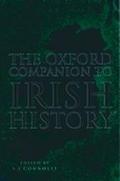

 |

|

The average rating for Oxford Companion to Irish History based on 2 reviews is 2.5 stars.
Review # 1 was written on 2020-10-23 00:00:00 Carolyn Callan Carolyn CallanThis isn't the first time and it won't be the last time that I will be reviewing a reference work that I read front to back but don't think that many people will need or want to do the same with. This book is a large one-volume historical dictionary that seeks to cover the broad scope of Irish history and manages to do so thoughtfully and well with a considerable amount of nuance given the limitations of its status as a reference work. This isn't a work I think that many people will gravitate towards, which is perhaps a bit of a shame but which reflects the way that it is possible for a work to say a lot in a way that few people are likely to read because picking up dictionaries and reading them is not a common habit for most people. It's unclear just exactly who this book is written for--obviously there are some people who want or need reference material on Irish history so that they can keep their Ui's and their Kildare earls straight, or ponder a way to reflect upon the differences between Brehon and English law, for example--but the target demographic for this book cannot be too big because there are simply not that many people, at least in the United States, who have that strong of an interest in Irish history. At more than 600 pages, this book is a sizable one. Perhaps the most interesting part for me, though far from predominant in its share of the contents, are the maps that are at the end of the book that show the regions and the regionalism that has long afflicted Irish history. The subject index of the book indicates the approach of the publisher as a whole for this work, which includes a great many Acts of Parliament, some material on agriculture as well as landlords and land system and land confiscation and settlement, Anglo-Irish relations, Anglo-Norman invasion and settlement, architecture and buildings, armed conflicts, battles, military organization, and defense, banking and finance, Catholicism and a whole host of other religious subjects including general religious topics, Church of Ireland, Methodism, Presbyterianism, Protestant dissent, and the Society of Friends, central government, chief governors and other office holders, constitutional and political structures, parliaments, monarchs, and the like. Aside from these topics there are subjects on history and historians, early peoples and dynasties, crime and protest, the foreign policy of the independent Irish Republic, places, family and marriage, medicine and public health, Northern Ireland, and printing and publishing, showing a broad range of concerns. It must be admitted, though, that if you do have a strong interest in Irish history and want to write at length about it, or research it for history, that this book is certainly an appealing work in that context. And I really cannot see any other context for reading this book other than a deep interest in Irish history, and not merely narrative history but also the specific nitty gritty details of Irish history, of which this book is immensely full. The goals of the work are to contain information about any sort of question that one will have about a significant aspect of Irish history. While I do not think that is necessarily the case with Irish literature, as this book leans heavily towards aspects of military, political, and social history, Oxford has a separate companion to Irish literature and so those questions belong to another work. The authors of these biographical essays and other entries wrestle with the personalities that drove some of the more drama-filled aspects of Irish history, and note that it was personalities rather than identities that appear to have been responsible for a substantial part of Irish division. |
Review # 2 was written on 2018-07-06 00:00:00 Klmlk Mlkm Klmlk MlkmI’m frustrated that this history is so sparse in some areas. How on earth can Terence MacSwiney rate only one sentence that doesn’t mention any of his writing or plays? The Easter Rising has no entry. Here are some examples of entires which belie the editor’s political beliefs. “Irish diaspora. Diaspora is a concept that during the 1990’s became fashionable in world history and in the specific Irish context as well...” “Irish-American nationalism, a product of the Irish emigrant experience from the 1840’s, shaped by national identity, nostalgia, Anglophobia, and social rejection in a new homeland.” (I truly cannot believe the word “Anglophobia” was used here. I’d say having antipathy for a country that committed genocide on your homeland results in something more complex than “Anglophobia.”) The entry for Irish language makes no mention of the suppression of the language and the resultant fact that it is considered an endangered language now. There are no entries for Bobby Sands, Long Kesh Prison, the Blanketmen, and it occurred to me that the editor does not believe Northern Ireland to be a part of Ireland, as is the political reality, yet not the geographic reality. This book is entirely from the English perspective of Ireland. Decolonize Irish history. I guess it’s not going to be done by the men of Oxford. |
CAN'T FIND WHAT YOU'RE LOOKING FOR? CLICK HERE!!!